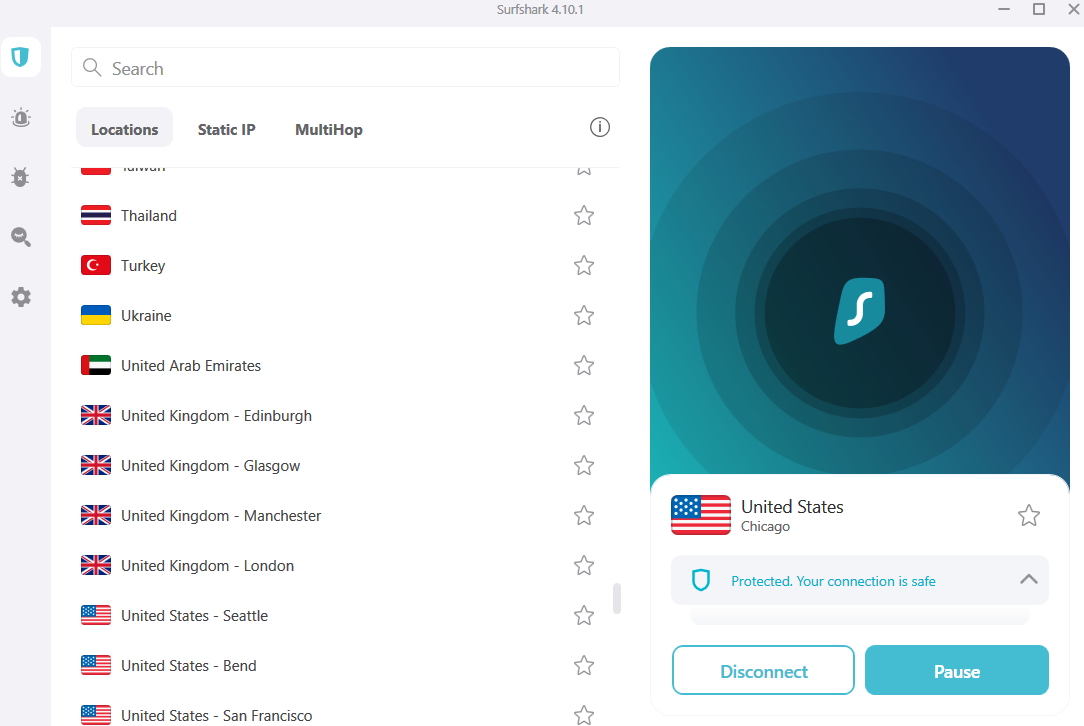If you’ve ever used a VPN you’ve likely come across the term “dedicated IP address.” But what exactly is a dedicated IP address, and do you need one?
With a typical shared VPN connection, many users are all connected to a server with the same IP address. A dedicated IP address on the other hand, is a fixed IP that is used only by you. There are both advantages and disadvantages to using a dedicated IP over a shared IP.
Here I’ll lay out what exactly a dedicated IP address is, the pros and cons of using one, and help you figure out if it’s the right choice for you. And if you’re in the market for a VPN, then don’t forget to check out our best VPN services to see our recommendations.
What is a dedicated IP address for a VPN?
In short, a dedicated IP address is a static, or fixed, IP address that never changes and is used by only one person. This differs from a normal VPN IP address, which is shared by other users of the same VPN and is often changed each time you connect.
Just like a normal VPN connection, a dedicated IP address still hides your real home IP address, but you’ll always connect to the same IP on that specific VPN server.
Most of the leading VPN services such as NordVPN, Private Internet Access, Surfshark, and others offer the option to upgrade to a dedicated IP address for an additional monthly charge.
What are the advantages of a dedicated IP over a shared IP?
Bypass streaming service restrictions
Don’t get stuck with the dreaded VPN connection blocked screen while trying to access your favorite streaming service.
Sam Singleton
Some websites such as Netflix are sensitive to IP changes and block traffic if you’re using a shared VPN. A dedicated IP address can help fix this issue since your IP will never change. Also, a dedicated IP address is less likely to be recognized as part of a VPN since it will only be associated with your specific traffic.
Avoid annoying captchas

You can avoid the maddening Captcha hell with a dedicated IP address.
Sam Singleton
When a lot of people are sharing the same VPN server, websites may misidentify the traffic as coming from a bot, therefore issuing a captcha test for all requests from users. This can be extremely annoying — I can’t be the only one who is sick of choosing all the pictures with bicycles in them.
By using a dedicated IP address, this issue can be alleviated as only your traffic will be coming from the server, making it seem much less suspicious.
Easy and secure access to remote networks
If you need to access a remote network for work, using a shared IP address with a VPN can be an issue as your IP address will frequently change — remote networks don’t always like this. With a dedicated IP address you can get all of the security and privacy benefits of a VPN connection while accessing your workplace network since your IP address will always be the same.
Are there any disadvantages to using a dedicated IP?
You have to pay for a dedicated IP address
Most VPN services that offer the option of a dedicated IP address won’t hand it out for free — you’ll need to pay up. The extra monthly cost of a dedicated IP address subscription can add up and unless you definitely need one for a specific reason, it might not be worth the expense.
Decreased anonymity
One of the reasons that VPNs do such a great job of protecting user anonymity is that oftentimes hundreds or thousands of users are accessing the same shared VPN server. This makes it very difficult to determine what traffic is coming from what user. A dedicated IP address takes away this level of anonymity as it ties the IP address traffic to you as the sole user — some find that this defeats the main purpose of using a VPN.
Geographical limitations

A shared VPN offers many different country server locations unlike a dedicated IP which is fixed.
Sam Singleton
By opting for a dedicated IP address, you’ll need to choose a location and that location will never change. A regular shared VPN connection on the other hand allows for users to connect to servers all over the world and thereby spoof their real location to bypass geo-restricted content. With a dedicated IP address you’ll miss out on this advantage except in the country you choose for your dedicated IP.
Do you need a dedicated IP VPN?
So the question still remains, do you actually need a dedicated IP address with your VPN? That will ultimately depend on your intended use, but the short answer: probably not.
For the majority of people, a dedicated IP will mean adding an extra monthly expense without much upside. There are of course niche use cases where a dedicated IP will be hugely beneficial.
People who travel or work from home and want a consistent, secure way to remotely log in to their workplace network immediately come to mind. Or maybe you want to protect all of your smart-home devices on the same network; then the dedicated route might be the way to go.
There are tradeoffs to both shared and dedicated IP VPNs. While there is usually an additional expense for a dedicated IP address, it isn’t anything outrageous. If you’re not sure, trying it out for a month or two won’t break the bank. Who knows, it might be the solution you’ve been looking for, and if not, no harm done.



